Taking Nutrition for the 2014 AFM FITTEST Competition to the Next Level

With the 2014 AFM FITTEST event just around the corner, what are you doing nutritionally to get a leg-up on your competitors? You could always eat more kale chips and less chips and salsa, more Greek yogurt and less Mexican vanilla ice cream, as well as more scrambled eggs and less fried avocado tacos. It also doesn’t hurt to ease up on the beer and margaritas, despite warmer weather and these beverages’ patio appeal. Common sense, however, can only take you so far. What cutting edge food and nutrition products are today’s athletes consuming to get an advantage on the rest of the playing field? Understanding the ins and outs of the two hot nutrition items outlined here will help you determine whether to include these substances in your AFM FITTEST training.
Caffeine
According to the Food & Drug Administration, caffeine—ingested by up to 90 percent of the world’s people—is the most popular drug. According to the Center for Science in the Public Interest, 80 percent of Americans have some caffeine on any given day. Caffeine is legal, inexpensive, and very easy to access, yet it is one of the most consistently—and scientifically—proven athletic performance enhancers.
Initially, caffeine was thought to be effective for sports performance because of its ability to increase fat burning. It was thought that, when the body used more fat, glycogen (the storage form of sugar used by muscles when a quick burst of speed or power is needed) was spared. Research in the 1990s, however, showed that caffeine’s real effectiveness lies in its ability to stimulate the central nervous system. Caffeine increases motor activity and attentiveness; moreover, caffeine improves perceived effort, which makes the work seem easier.
 Does this mean athletes need to take caffeine pills or pound a venti Starbucks before training? Absolutely not. Research revealed that caffeine’s effect varies greatly among people, so it’s important to experiment during training with small amounts. Caffeine can be addictive, affect sleep, contribute to anxiety, and stimulate the heart. Also, caffeine is a hidden ingredient in various medications and supplements. Make sure you are not already taking caffeine before trying to implement more. To start, try 100 to 200 mg (the equivalent of 8 ounces of brewed coffee) one hour before training.
Does this mean athletes need to take caffeine pills or pound a venti Starbucks before training? Absolutely not. Research revealed that caffeine’s effect varies greatly among people, so it’s important to experiment during training with small amounts. Caffeine can be addictive, affect sleep, contribute to anxiety, and stimulate the heart. Also, caffeine is a hidden ingredient in various medications and supplements. Make sure you are not already taking caffeine before trying to implement more. To start, try 100 to 200 mg (the equivalent of 8 ounces of brewed coffee) one hour before training.
Chia Seeds
Chia seeds are one of the newest so-called “super foods.” These seeds come from a small desert plant and were a staple in the diet of the Aztecs. Health claims associated with chia seeds include improved heart health, weight loss, and enhanced sports performance. Athletes around the globe are telling stories about chia seeds’ dramatic effect on their life.
While chia seeds do contain omega-3 fatty acids, protein, fiber, and antioxidants, little published research exists to confirm all of the health claims. Chia seeds do seem to be good for hydrating, as they absorb up to ten times their weight in water. Because of this hydration factor and the protein and antioxidants found within them, eating chia seeds after training may be beneficial. Though they are a very healthy seed to add to any nutritional catalogue, limited research has shown their direct effectiveness in enhancing sports performance. Try them sprinkled on oatmeal, mixed in a smoothie, or combined with yogurt, vanilla extract, and maple syrup (let mixture sit overnight) as a “pudding.”
Although “magic” solutions seem to be marketed everywhere, nothing can take the place of a proper training and eating regimen. Do your research or consult a registered nutritional dietitian to determine if the latest and greatest product is appropriate for you.
To understand the importance of nutrition during AFM FITTEST training and to find specific guidelines on eating before, during, and after workouts and on competition day, see Parts 1, 2 and 3 of the 2013 AFM FITTEST Nutrition Series at austinfitmagazine.com.






